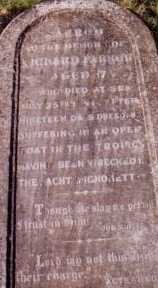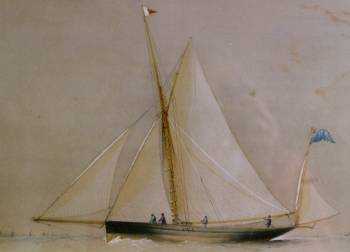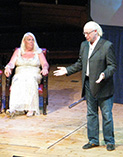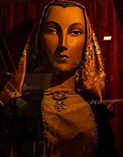"Edgar Allan Poe predicted that one of my family members would be eaten. The strange coincidences still haunt us."
There are few persons, even among the calmest thinkers, who have not occasionally been startled into a vague yet thrilling half-credence in the supernatural, by coincidences of so seemingly marvellous a character that, as mere coincidences, the intellect has been unable to receive them". Edgar Allan Poe, The Viking Portable Poe
All at Sea with Strange Coincidences
The descendants of Richard Parker tell the story of how his legacy still haunts the family.
Arthur Koestler was a famous writer and researcher who bequeathed his fortune to establish a chair for the study of the paranormal at Edinburgh University. In 1974, he offered a prize for the most extraordinary coincidences he received. My cousin Nigel Parker won. But the weird story he unearthed was only the start of a run of peculiar events that have plagued our family ever since.
Dinner on 25 July 1884 will always be remembered in our family for the unusual main course: my grandfather's cousin, a 17-year-old cabin boy called Richard Parker.
Our family roots are in Woolston on Southampton Water. And, like many of my family before and after him, Richard ran away to sea. He boarded the Mignonette, a ship built on the Thames for an Australian millionaire who wanted to explore the Great Barrier Reef.
Captain Tom Dudley
The vessel's captain, Tom Dudley, had trouble commissioning a crew for her long voyage, so her owner went on ahead by ocean liner to avoid delay. Later, the Mignonette, with Edwin Stephens as mate and Edmund Brooks as hand, left Southampton, their last port-of-call, for the long haul to Australia.
It was Richard Parker's first voyage on the high seas. Thomas Dudley was a sturdy and resourceful captain. Stephens and Brooks went about their duties efficiently, but Richard had problems.
When the South Atlantic hurricane broke, they were 1,600 miles from land. Huge waves hit the Mignonette, and it sank. In a panic to board the lifeboats, the crew could not salvage any provisions or water except two small tins of turnips.
Nothing to Eat or Drink
The crew had very little to eat or drink for 19 days and became desperate. Richard Parker drank seawater and became delirious. Captain Dudley considered drawing lots to choose a victim to feed the remaining crew. Brooks was against any killing whatsoever, Stephens was indecisive, so the Captain decided to kill the boy as he was near death and had no dependents.
They said some prayers over Richard's sleeping body. Dudley shook him by the shoulder and said: "Richard, my boy, your time has come". The three sailors dined and survived on Richard's carcass for 35 days until rescued by the aptly named vessel S S Montezuma- named after the cannibal king of the Aztecs.
The resulting court case fascinated Victorian society and became the best-documented study of cannibalism in this country. Dudley, Stephens, and Brooks were each sentenced to six months of hard labour and later emigrated.
And it gets more amazing...
But the story has a strange twist in its tail. Half a century before the grisly events, in 1837, Edgar Allan Poe wrote The Narrative of Arthur Gordon Pym of Nantucket. This book tells of four shipwrecked men who, after many days' privation, drew lots to decide who should be killed and eaten.
The cabin boy drew the short straw. His name was Richard Parker!
Arthur Koestler Investigations
My cousin Nigel Parker was the first to notice the link between the Poe story and actual events, which Arthur Koestler published in The Sunday Times on May 5, 1974. The author of a book about strange coincidences tells how he casually mentioned it to John Beloff at the University of Edinburgh sometime after the news story, who had written about it that day in his journal.
Nigel's father, Keith, thought that Richard's story would make an interesting theme for a radio play and began to plan a synopsis. At that time, he reviewed books for Macmillan Publishers to supplement his income as a writer. The Sinking of the Mignonette was the first book to arrive through the post. A few weeks later, he was asked to review another play, among a collection of short plays, called The Raft. It was a comedy for children with nothing sinister about it at all, apart from the cover illustration. Three men seemed to threaten a young boy, entirely out of keeping with the play's tone. The Raft was written by Richard Parker.
Lunch with the Spanish Students
In the summer of 1993, my parents took in three Spanish-language students. One evening, my father, Don Parker, told them about Richard Parker over supper (probably to keep the food bills down). The television was on in the background. The conversation stopped when a local programme began discussing the remarkable story. Dad broke the silence by saying that weird coincidences always occur whenever Richard's tale is mentioned. He told them about Edgar Allan Poe.
Richard Parker Coincidences
Two of the girls went white. "Look what I bought today," said one. She reached into her bag and pulled out a copy of the Edgar Allan Poe story. "So have I!" said the other girl. Both had gone shopping that day and independently bought the very same book containing the Richard Parker story. And as if events were trying to make my story totally unbelievable, my father told the same story in his language the following year. Again, one of the girls pulled a copy of the Poe book out of her bag!
"This was our family's first venture into catering."
- Don Parker (Restauranter.)
Last month I received a letter from a man who had read another article I wrote about Richard Parker. Immediately after he'd read it he gave professional advice to a friend, who was complaining about his employer. The employer he discovered had been researching his family tree and said to the person who wrote to me, "Well, I reckon this riding roughshod over legal procedures is in his blood. This guy is into tracing his ancestors, and one of them was a sea captain, Dudley, who was done for eating a cabin boy and cheating at drawing lots...."
Graveyard Oddity

To the memory of Richard Parker Aged 17 who died at sea July 25th, 1884 after nineteen days of dreadful suffering in the open boat in the tropics having been wrecked in the yacht Mignonette
Though He slays me yet I trust in Him. JOB 15
Lord lay not this sin to their charge ACTS 11.60
Although Richard Parker's body was buried at sea, a headstone was erected in his memory at Pear Tree Churchyard near his birthplace in Woolston, Southampton. Captain Dudley is said to have paid a local family to keep the stone clean in perpetuity. They were so ashamed of accepting his legacy that they asked that their names be kept secret. They would only clean the stone at night.
Thomas Dudley left a legacy after emigrating to Sydney, Australia, where he established a Chandlery. Locals knew him as Cannibal Tom. He died in an outbreak of bubonic plague in Sydney in 1900. (Some sources claim that he was the first person to die of bubonic plague in Australasia.) He died at his home in Drummoyne on 24 February 1900, and his body was brought over by steamer to the Quarantine Station, where he was buried in the Third Quarantine Cemetery.
The Mignonette

This is the only known painting of the Mignonette now owned by Barbara Boon from Yarmouth, whose grandfather's cousin (Thomas Hall) was the solicitor who owned the boat from 1875 to 1882.
They had trouble finding a crew because the boat's repairs were bogged down. The wood around the stern was rotten and was repaired with screws rather than a copper bolt.
The man called in to make the repairs objected, but did the job as instructed. He said later that he would carry his guilt to the grave. "I just wonder whether there isn't some kind of debt to pay over the loss of Richard Parker, the death of Dudley (who was honest about the whole affair) and the guilt of the old boat builder," says Barbara. "And I wonder what Dudley's descendants feel and what his children felt as they grew up surrounded by such a haunting story?"
(The Mignonette had a sister ship called the Peregrine)
And it gets weirder still...
Was it a Coincidence or a Prediction?
Strange Coincidences Experiences mailed to me from people reading the article when I published it in the Fortean Times
In the early 1970s, The Sunday Times asked readers to write about their examples of coincidences. One historical example that several of them sent in was this -
In 1838, Edgar Allan Poe published a book ", The Narrative of Arthur Gordon Pym of Nantucket ". At one point in this novel, four men are adrift in a boat. They kill and eat the cabin boy, Richard Parker. Some 40 years later, four desperate men were adrift in a boat, and to survive, they killed and ate the cabin boy whose name was Richard Parker.
When I told two friends of this coincidence in 1982, I found their respective reactions interesting."That gives me the willies! ( J.Tisdall.) "I would expect that to be better known if it were true." (M.Stean.)
In 1984, I became increasingly interested in the phenomenon of coincidence and decided to pursue this classic example.
Parker is a Loser
I went to a bookshop and bought Poe's novel. On page 141, cabin boy Richard Parker proposes that he, Peters, Augustus and Arthur Gordon Pym (narrating in the first person ), who is by now the only surviving crew aboard The Grampus, should draw straws to see which one of them should be killed and eaten to provide sustenance for the others.
This is done, and poor Parker is the loser. Like Stean, I found it surprising that such a striking coincidence was not remarked upon more often. In the decade or so since I had read this in The Sunday Times, I had not seen any reference to it
I bought the book in mid-November 1984. A couple of weeks later, I turned up at Bedford railway station to catch the 9:50 AM train to London. I still say I was there with a few minutes to spare, but it appeared that this was one of the very few occasions in which a BR train had actually left early.
Accordingly, I had to catch the 10:20. In the carriage that I got into, someone had discarded a Daily Telegraph. Under normal circumstances, this would never be my first choice of paper, and it had undoubtedly been a good six months since I had looked at a copy.
On the diarist's page (I think he is called Peterborough )I spotted this -(From The Daily Telegraph, December 1st, 1984.).
David Shepherd
SOFT CELL My recent note about the last case of cannibalism to cause a ripple in English legal circles reminds wildlife painter David Shepherd that some years ago, he was browsing Falmouth's antique shops looking for an old oak door for his family home in Hascombe, Godalming.
What Shepherd and his wife, Avril, came across was a door from a cell in Falmouth jail - the very door, Shepherd was told, that had closed on the two men accused of eating cabin boy Richard Parker in 1884.
Shepherd tells me that not only does the door still bear bars and a grill, but that its main attraction was that it only cost £7 - and now guards nothing more offensive than the family junk.
One week later, the family newspaper, The Guardian, was not delivered, probably due to a strike. In its place, we received The Daily Telegraph. In Peterborough's column, there was this:
AD NAUSEAM
Richard Parker would appear to be a name to avoid if one proposes going to sea. Not only were two of those name victims of maritime cannibalism- one a fictitious character by Edgar Allan POE and the other, a real-life victim aboard the Mignonette 100 years ago but evidence of other Parkers now crops up.
Brian Simpson, Professor of Law at the universities of Kent and Chicago, reminds me that Richard Parker was hanged for his role as ringleader of the Nore mutiny in 1797. Another Parker died when the Francis Speight, on board which several seamen had been eaten, foundered in 1846.
Such grisly anecdotes are the very spice of life to Simpson, who has recently compiled some "fairly ghastly" examples of man-eating men for his book "Cannibalism and the Common Law".
Chess Puzzle
As I observe, it is not that powerful, particularly in comparison with the unbelievable example of the three Spanish girls in your father's house all buying the book on the same day, the day, moreover, when there was a mention of this coincidence on Television.
My interest in coincidence rarely extends beyond my own examples. This one is the most improbable I have ever heard, and I would be highly grateful to more corroborative details.
You were playing chess on your computer when I, a grandmaster and former British champion, rang you. I, too, had a computer screen full of chess writing in front of me at the time, for I was writing a chess book.
James Plaskett - East Sussex (James Plasket has since written a book about Coincidences)
Sunday Telegraph Responses
The article which appeared in the Sunday Telegraph of 27 October about the cabin boy who was eaten by the crew, and your experiences of coincidence, were fascinating.
I have to say that my husband and I do not usually buy Sunday newspapers, but my daughter and her friend were house-sitting for us while we were on holiday, and the friend bought the Sunday Telegraph. I read it on Monday and immediately thought, "What a coincidence!"
My husband and I were on holiday in Guernsey, staying in the Duke of Normandie Hotel in St Peter Port. On Saturday, 26 October, we were sitting at a table in the bar, and on this table, the story of the shipwreck and the fate of the cabin boy was carved into the wood. I was quite sceptical of this story and could hardly believe it when I read about it again in the following day's Sunday Telegraph.
JANICE ROBERTSON- Loanhead, Midlothian
Haunting Name
I don't know if you can print this, but I wrote the day after I received my subscription copy of FT with the tale of Richard Parker's death by cannibalism and the coincidences which crop up whenever his name is mentioned.
Last night, feeling a little under the weather, I read my FT from cover to cover, which is not my usual practice. Then I fell asleep. Also, against my usual practice, I stayed in until past 11 AM, when a phone call roused me from a friend asking me to help him compose a letter to his employer, Dudley's, with whom he is in dispute over the withholding of sick pay. After writing and mailing the letter, we went to a local advice centre to find out precisely what the legal position was.
During the course of the interview, my pal was told that his employer. Terry Dudley was riding roughshod over accepted legal procedures. Then we went for coffee, and a discussion of the boss's class mindset ensued. "Well, I reckon this riding roughshod over legal procedures is in his blood," said my friend. "This guy is into tracing his ancestors, and one of his ancestors was a sea captain who was done for eating a cabin boy without drawing lots....."
My pal wasn't an FT reader (though I reckon he will be now!), and the relevant issue of FT hadn't yet hit the shops. I'm willing to bet this is not the only Richard Parker-based coincidence letter you receive.
As Terry Dudley must also be distantly related to the guy who ate the distant relative of Craig Hamilton-Parker, pass this on to him.
Carlton B Morgan - Newport, Gwent.
Weirdness at Falmouth
I am interested in the strange coincidences of the cannibalism incident (FT92) in your family's history. Your account of the survivors' stay here in Falmouth is brief, so I looked up the microfilm copies of "Lake's Falmouth Packet and Cornwall Advertiser" (the local weekly paper) in the library here. The story was very fully reported in the 13/9/1884 edition, and the trial was followed almost every week to the end of the year. (I realise that you have probably seen this material already)
The locals were very interested in the case and sympathetic towards the accused. The men appeared before local magistrates on Monday after they landed, when they were remanded in custody until Thursday, somewhat to their surprise, because they had planned to return to their homes! At the second hearing, they were allowed home on bail (much of which was put up by Falmouth supporters)
The Packet
The "Packet" reported: "During the (second) hearing of the case, a seaman was painfully interested in the proceedings- Parker's brother. He was dressed in the usual costume of a yachtsman, with the name 'Marguerite' sewn in red on the breast of his jersey. After the court, he came over to Captain Dudley to speak to him.
Dudley extended his hand, which Parker accepted. They only had a few words of conversation regarding the wages of the deceased, which Dudley informed Parker was at the Customs House." (Dudley's previous command was the steam yacht 'Myrtle', so there was the SS 'Montezuma' and 3 yacht names with the initial 'M' connected to the case.)
The "Packet" also reported that the memorial headstone in Pear Tree Churchyard was paid for by Mr Haskins, Engineer, of London. It was supposed to bear a copy of a photograph of Richard Parker by 'the endolithic process', but the picture in your article shows no sign of this. (The photo supposedly used was of Richard's brother William at age 17, because of their strong resemblance)
I now live in Falmouth, but I once lived in Brightlingsea (and later in Ipswich). This is the area where two of the survivors lived. At that time, I worked as a professional yacht skipper myself and sailed several times into Southampton- happily, I never had to dine off my crew!
R J DOWNHAM- Falmouth, Cornwall
Strange Stories Surround my Book
Hello Craig. Here is a weird synchronisation that interests me. This week, I borrowed a copy of your book The Psychic Casebook from my local library. I have found the book immensely absorbing, with lots of interesting cases. The chapter on coincidences particularly caught my attention—it tells the true story of the shipwrecked sailors of the Mignonette.
The coincidence is that when I borrowed your book from the library, one of the books I took back, having read it last week, was ' The Custom of the Sea'. This is a new book about the wreck and survivors of the ship Mignonette.
Greg Smith.
Sceptical Daughter
Sent Friday, September 27, 2002, at 08:12:13 from Tom Gordon
This morning, I was discussing coincidences with my 11-year-old daughter, who is out of school today with the flu. Not believing some of the examples I gave her, I suggested we look on the Internet for others. Your story about Richard Parker, who cannibals ate, came up, and we read it with interest. It refers to the fact that David Shepherd bought the door from Falmouth Jail, which housed the real cannibals, for his house in Hascombe.
We have just moved from Hascombe, where we have lived at Hoe Farm for the last 7 years, the previous weekend retreat of Winston Churchill, and knew David Shepherd's house, as some friends of ours had purchased it recently. Needless to say, my daughter is no longer so sceptical.
Tom Gordon
Life of Pi Connection
Sent Tuesday, June 10, 2033, by Julian Harrow
Have you read Life of Pi by Yann Martel? In it, a boy is shipwrecked on a lifeboat with a Bengal tiger named Richard Parker. Did the author know this story, or is this yet another coincidence?
Julian Harrow
Arthur Gordon Pym
Sent by post 1 Nov 2003 From Sarah Monks - Hong Kong
It was a weekend in the early '70s. I was reading the Sunday Morning Herald at the family breakfast table in Sydney. I saw a re-run from The Sunday Times literary competition, in which someone (your cousin Nigel?) won the prize for submitting an entry on fiction pre-figuring fact.
At that very moment, I was reading Edgar Allan Poe's psychedelic novel The Narrative of Gordon Pym. I had it near me and said to my mother, "What a coincidence! This is such an obscure book!" She said an even bigger coincidence was in the trunk under the house.
It was a manuscript my father, Noel Monks, was working on at the time of his demise in 1960, when he lived in England. A war correspondent and journalist with the Daily Mail in London, he had submitted a synopsis to his publisher about The Strange Fate of the Barque Mignonette. On the inside cover, he noted that Edgar Allan Poe had foreshadowed the horrible demise of Richard Parker. His story was to be a psychological exploration of what happened on the life raft.
Arthur Koestler Prize
Your website mentions that Arthur Koestler sponsored the 1974 prize your cousin Nigel won. I enclose a photocopy from my father's book, Eyewitness (Frederick Muller Ltd, 1955), about an incident during the Spanish Civil War when he and another correspondent helped to save Arthur Koestler's life.
Finally, you are probably aware that Yann Martel's Life of Pi (winner of the 2002 Man Booker Prize) is about a shipwreck. One of the main characters is Richard Parker, but only this time, the tables are turned. He is a 450-pound Royal Bengal Tiger looking for his lunch! To whom this is copied, Yann Martel was surely inspired by Edgar Alan Poe. If I'm not mistaken, a dog was on A. Gordon Pym's lifeboat. He was called Tiger...
Cannibalism of Pi Patel
Sent Saturday, August 06, 2005, at 00:18:28
Here's a Richard Parker fluke not mentioned in the article: The Francis Speight foundered at sea in 1846. There were deaths and cannibalism aboard. One of the victims was Richard Parker.
Here's another one: In Yann Martel's fable, Life of Pi, 16-year-old Pi Patel (the son of a zookeeper) is trapped for 227 days on a 26-foot lifeboat with a 450-pound Bengal tiger named Richard Parker.
The latter doesn't really count as synchronicity, though, because Martel knew about cabin boy Richard Parker and the Poe tale.
I also use the Richard Parker story in my upcoming novel, Romancing the Raven. The story explains how Poe learned about Richard Parker's demise—the answer: time travel.
Rob MacGregor









